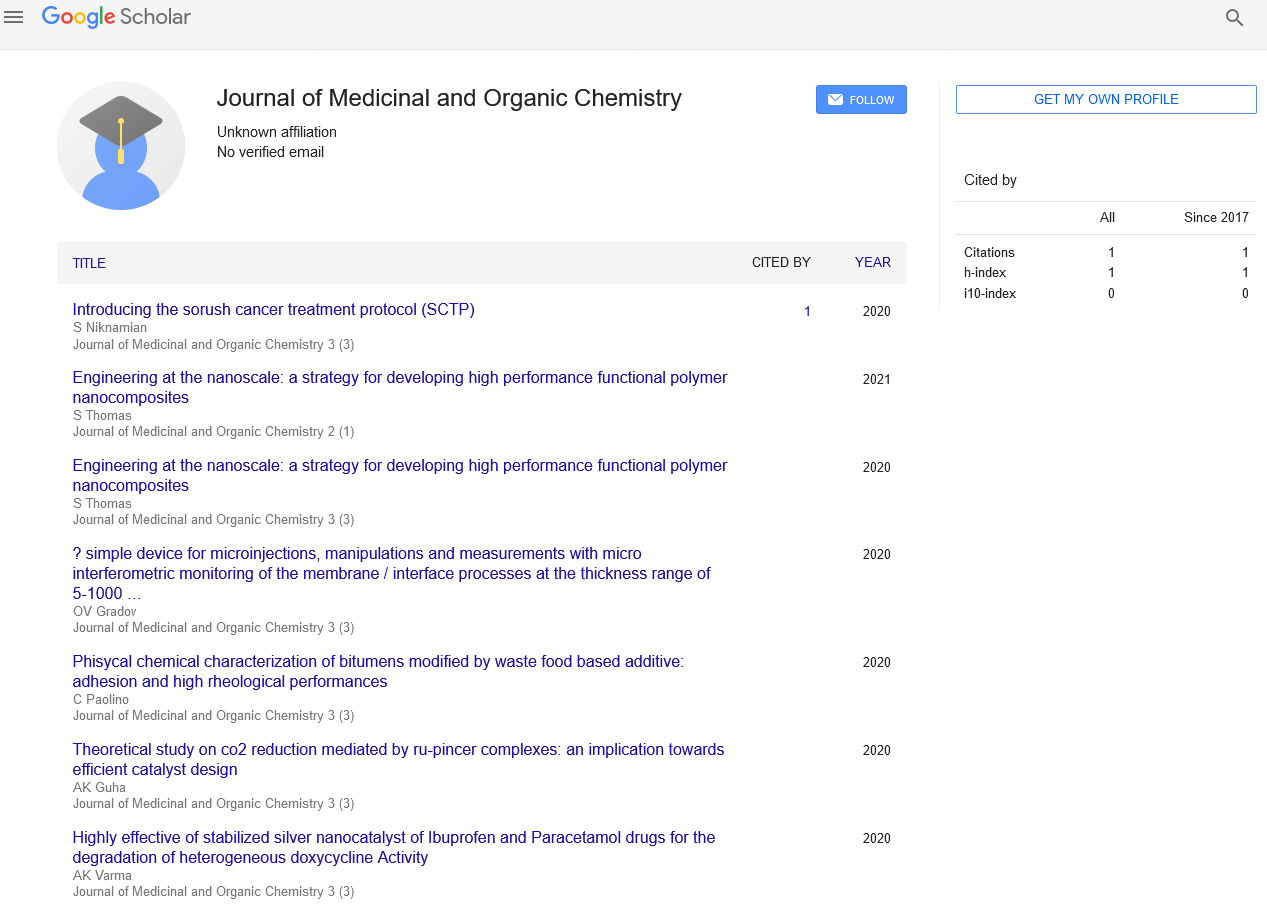Perspective - Journal of Medicinal and Organic Chemistry (2023) Volume 6, Issue 5
Diabetes Research: Pioneering the Path to a Healthier Future
- Corresponding Author:
- Deo Jhon
Department of Health Science,
University of Floria,
Gainesville,
United States
E-mail: jhon.doe@gmail.com
Received: 15-Sep-2023, Manuscript No. JMOC-23-118867; Editor assigned: 20-Sep-2023, PreQC No. JMOC-23-118867 (PQ); Reviewed: 04-Oct-2023, QC No. JMOC-23-118867; Revised: 19-Oct-2023, Manuscript No. JMOC-23-118867 (R); Published: 27-Oct-2023, DOI: 10.37532/jmoc.2023.6(5).131-132
Introduction
Diabetes, a chronic metabolic disorder characterized by high blood sugar levels, has emerged as a global health crisis. Its prevalence continues to rise, impacting millions of lives. However, through rigorous research and scientific advancements, we have made significant strides in understanding and managing diabetes. This will explore the multifaceted world of diabetes research, delving into its historical backdrop, the key areas of focus, recent breakthroughs, and the promises it holds for a healthier future.
Description
The diabetes epidemic: A global challenge
Diabetes is a formidable health challenge that transcends borders and demographics. It affects individuals of all ages, genders, and ethnic backgrounds, exerting a profound impact on health systems and economies worldwide. To combat this complex condition, researchers have dedicated their efforts to uncover the mysteries of diabetes and develop innovative approaches to treatment and prevention.
Key areas of diabetes research
Type 1 diabetes: Research in type 1 diabetes focuses on understanding the autoimmune processes that lead to the destruction of insulin-producing beta cells. Advances in immunotherapy and regenerative medicine offer potential cures or interventions to halt the progression of the disease.
Type 2 diabetes: Studies on type 2 diabetes explore the genetic, lifestyle, and environmental factors that contribute to insulin resistance and impaired glucose metabolism. Lifestyle interventions, new medications, and bariatric surgery are among the areas of active research.
Gestational diabetes: Researchers aim to improve screening and management of gestational diabetes to ensure the health of both mother and baby during and after pregnancy.
Complications: Understanding and preventing diabetes-related complications, such as diabetic retinopathy, neuropathy, nephropathy, and cardiovascular disease, are critical areas of research.
Artificial pancreas: The development of artificial pancreas systems, which automatically adjust insulin delivery based on real-time glucose levels, is a promising avenue to enhance diabetes management.
Prevention: Diabetes prevention research focuses on identifying effective lifestyle interventions and medications to reduce the risk of developing type 2 diabetes, particularly in high-risk populations.
Global impact: Research examines the global burden of diabetes, strategies for healthcare delivery, and culturally sensitive interventions to address the disease’s impact in diverse populations.
Recent breakthroughs in diabetes research
Closed-loop insulin delivery: Closed-loop insulin delivery systems, also known as artificial pancreas technology, offer improved blood sugar control and reduce the risk of hypoglycemia. They have brought hope to people with type 1 diabetes.
Islet cell transplantation: Research into islet cell transplantation, which involves transferring insulin-producing cells from a donor pancreas to a recipient, has made significant progress, potentially offering a cure for type 1 diabetes.
Precision medicine: Advances in genomics and personalized medicine have enabled researchers to tailor diabetes treatment and prevention strategies to an individual’s genetic and metabolic profile.
Telemedicine and digital health: The integration of telemedicine and digital health technologies has transformed diabetes care, allowing remote monitoring and improving patient adherence to treatment plans.
Bariatric surgery: Ongoing research into the effects of a bariatric surgery on diabetes h as demonstrated its potential to induce remission in type 2 diabetes, offering a life-changing option for some patients.
Immune modulation therapies: Innovative immune modulation therapies are being explored to prevent the autoimmune attack on beta cells in type 1 diabetes.
Promises of diabetes research
Improved management: Research continues to refine diabetes management, making it more convenient, effective, and individualized for people living with diabetes.
Early detection and prevention: Advancements in early detection and diabetes prevention strategies offer the potential to reduce the global burden of the disease.
Precision medicine: Tailoring treatment plans based on an individual’s unique genetic and metabolic characteristics holds the promise of enhancing the effectiveness of diabetes care.
Potential cures: Ongoing research into islet cell transplantation, immune modulation, and regenerative medicine provides hope for potential cures for both type 1 and type 2 diabetes.
Global impact: Research on culturally sensitive interventions and strategies for healthcare delivery can help reduce health disparities and improve outcomes for diverse populations worldwide.
Challenges and future directions
Rising prevalence: The increasing global prevalence of diabetes poses a formidable challenge for healthcare systems and resources.
Access to care: Disparities in access to diabetes care and medications remain a critical issue, particularly in low-income and underserved populations.
Affordability of medications: The high cost of diabetes medications and insulin, particularly in the United States, has raised concerns about affordability and patient access.
Diabetes-related complications: Despite progress, preventing diabetes-related complications remains a significant challenge.
Lifestyle factors: Addressing lifestyle factors, such as diet and physical activity, continues to be a complex and multifaceted issue.
Conclusion
Diabetes research has come a long way, from the discovery of insulin to cutting-edge advancements in precision medicine and regenerative therapies. As we look to the future, the promises of improved management, potential cures, and the reduction of diabetes-related complications are on the horizon. Challenges, such as access to care and rising prevalence, persist but are met with a commitment to a healthier future. Through unwavering dedication and scientific innovation, the path to a brighter horizon for diabetes management is illuminated, offering hope and improved well-being to those affected by this chronic condition.

